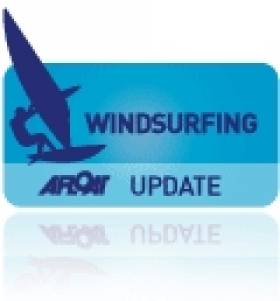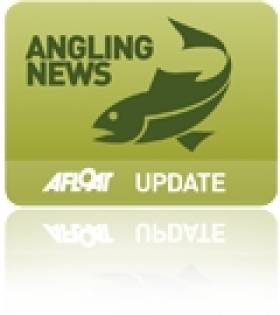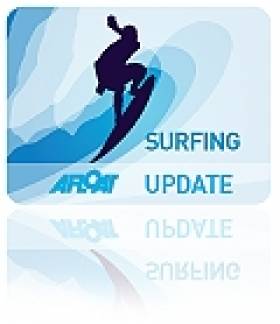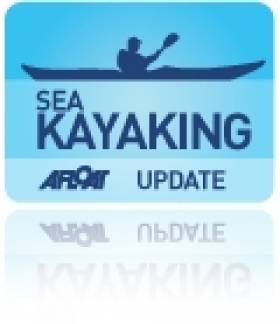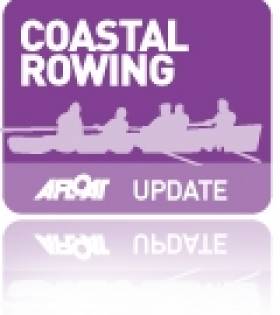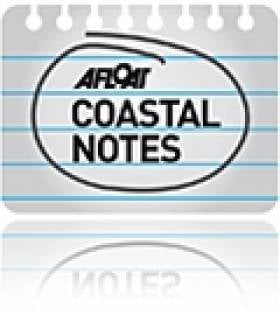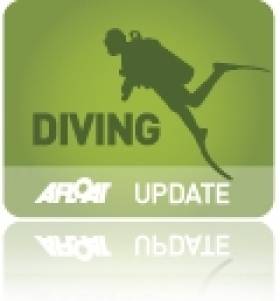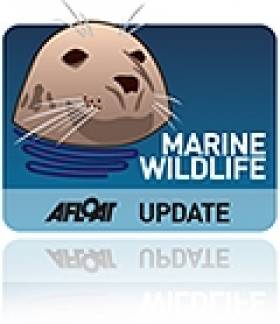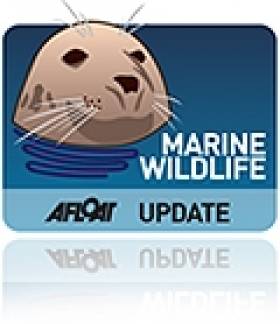Displaying items by tag: record
Van Gelderen Claims New Irish GPS Speed Sailing Record
#SpeedSailing - Ireland may have a new speed sailing record after Oisin van Gelderen laid claim to a 46.67-knot run at West Kirby Marine Lake in northwest England yesterday (Wednesday 28 January).
The multiple-time national champion says the WGPSSRC, the governing body for GPS speed sailing records, is currently analysing the files from his two GPS units before ratifying the new record, which he set on the man-made lake in the Wirral in winds of up to 45 knots and amid "huge squalls in hail showers".
He explained of his chosen location: "When wind direction is correct (120-135 degrees off wind) we can sail extremely close to the wall of the lake to get flattest water, uninterrupted by the strength of the wind.
"Yesterday was one of those days, though the wind turned out a little too broad, making the water too choppy and ultimately slowing us down as there was not enough space to do longer runs, meaning crashing was a huge possibility."
Van Gelderen says one fellow speedster was hospitalised with suspected concussion and whiplash from crashing "into the water - not the wall".
The potential new record, representing van Gelderen's average speed over 10 seconds, beats his previous record of 45.02. He also says he upped his average of five fastest 10-second runs to 44.97 knots, and peaked at 47.3 knots. Details of his session are available HERE.
At time of writing, the record would put him fourth in the world for GPS speed sessions in 2015 - though the table is subject to change at any time as windsurfers from around the world contribute their data.
Van Gelderen also points out that the Irish record set by his late friend John Kenny and sanctioned by the WSSRC still stands.
But the Skerries windsurfer isn't resting on his laurels, aiming for an even stronger run at Bunbeg in Donegal, where he sailed last week.
"It has huge potential [for me] to go much faster," he says. "Fifty knots is in my sights."
Bunbeg GPS Speedsailing 11-1-15. Fast Course from IR 777 on Vimeo.
'It Was This Big!' Angler Breaks Skate Record - But Doesn't Make The Books
#Angling - Billy Wallace reeled in a record-smashing catch recently in the form of a 225lb common skate - but sadly won't see his name in the record books, as the Angling Times reports.
The sea angler was fishing in Donegal Bay off Sligo on Declan Kilgannon's Kiwi Girl when he landed the whopper, estimated to be 4lb heavier than the Irish record set more than 100 years ago.
However, because he released the fish back into the sea immediately after, Wallace's catch cannot be made official.
But at least he has a photo to show for it, meaning his story is anything but fishy!
American Is World's 'Fastest' Dinghy Sailor
#Fireball - High performance helm Ned Goss has been rated the fastest dinghy sailor in the world, according to Sailing Anarchy.
The South Carolina-based Fireball racer was reportedly recorded by his Velocitek meter at hitting a peak speed of 36.5 knots off the coast of Charleston in a sea breeze typical for the area.
That incredible number, achieved in what Goss says was a virtually unmodified Mach 2, smashes the previous record of 32.4 knots set by Chris Rast by more than four knots.
But Goss believes he can go further, with mods to the vessel and optimum currents meaning "40 knots is just around the corner".
Sailing Anarchy has more on the story HERE.
NI Surfers Wanted To Help Break Unique World Record
#Surfing - The Belfast Telegraph reports that surfers across Northern Ireland are being sought to help break a unique surfing world record later this year.
Portrush surf school proprietor Carl Russell is planning the bid to set a new record for the most people standing on the same wave at the same time - currently standing at 110 surfers, set in South Africa in 2009.
Stability will be crucial to the challenge, so only surfers of intermediate level up need apply.
But with surfing becoming such a popular pastime around Ireland's coastline, finding enough participants should be less difficult than ever before.
And the record aside, the attempt is a great opportunity to raise funds for the RNLI, following the £600 raised for the lifeboat charity last year.
The Belfast Telegraph has more on the story HERE.
Derry-Born Surf Kayak World Champ Gets Congrats From Home
#Kayaking - Derry Mayor Martin Reilly offered his congratulations to native son Jake King on taking the surf kayak world title in Australia earlier this month.
As the Derry Journal reports, 18-year-old King was crowned champion after topping three other reigning top dogs in the men's longboat, masters and junior short boat in the final of the competition at Maroochydore beach in Queensland.
According to his father Paddy, Jake King can now add his name to the list of five previous world champions from the Canoe Association of Northern Ireland (CANI) surf kayak club - which includes his brother Corin.
In other kayaking news, a London paddler has broken the record for circumnavigating the Isle of Man in the Irish Sea.
BBC News reports on the feat achieved by 39-year-old George Shaw, who completed the 115km route around the island in 11 hours 43 minutes - smashing the previous record by almost an hour.
Irishman Sheehan in Record-Breaking Rowing Crew
# coastalrowing: Irishman Gavin Sheehan and his three crewmates aboard the Black Oyster have set a new record for rowing around Britain. The Islanders rowed approximately 2,000 miles non-stop around Britain from Tower Bridge in London in 26 days nine hours nine minutes and 58 seconds. The previous record was 26 days 14 hours and 11 minutes. There is a prize of £100,000 for the record.
The 25-year-old Corkman represented Ireland at the Home International Regatta in 2005. He won the Junior Pairs title at the Irish Championships with his brother Graham in the same year.
Rockall Adventure Delayed By Heavy Seas
#Rockall - Endurance adventurer Nick Hancock has returned to port after having aborted his landing on the tiny island of Rockall in the North Atlantic.
As previously reported on Afloat.ie, the Briton was set to begin a two-month sojourn living on the minuscule rocky outcrop that experiences some of the world's largest waves inside an eight-foot water tank 'survival pod', in an effort to raise money for the Help for Heroes charity.
But The Guardian says heavy seas on Friday morning 31 May made landing on the island impossible, forcing his return to port at Harris in the Outer Hebrides.
"I'm disappointed, but not wholly surprised," he said upon his arrival. "We thought it was going to be all about the weather and swell, and we knew the weather window was really tight."
Hancock still hopes to get onto the island in the coming weeks and beat the previous solo stay record of 40 days set by SAS vet Tom McClean in 1985 and the 42-day record set by three Greenpeace protesters in 1997.
However, the rougher weather of late summer may scupper his plans to get off the island at the end of his stay if the adventure is delayed for much longer.
Ireland, the UK, Denmark and Iceland all lay claim to the disputed island northeast of the Donegal coast, which is 31m across at its widest point.
Irishman Breaks Longest SCUBA Dive Record
#DIVING - Irish diver Paul Devane has smashed the Guinness World Record for the longest cold saltwater SCUBA dive in his second attempt.
Diving.ie reports that Devane set a time of 13 hours and 4 minutes off Killary in Co Galway on 9 October - breaking through the bar set by a Maltese team in February this year, who themselves broke the record set by Devane's brother Declan in 2009.
Speaking to the Irish Independent ahead of his successful second attempt, Devane said: "It will be cold, it will be long... There will be no breaks, no meals, no toilet stops."
Devane said his main aim was to raise money for his chosen charities Hang in Hand, supporting families of children with cancer, and the RNLI.
Find out more about Devane and his record-breaking dive HERE.
Whale and Dolphin Strandings On the Rise in 2012
#MARINE WILDLIFE - The rate of cetacean strandings on the Irish coast remains unusually high, according to the Irish Whale and Dolphin Group (IWDG).
The group's Cetacean Stranding Scheme recorded 162 strandings in 2011 which, while numbers do vary from year to year, was 25-30 more than anticipated.
And already this year the numbers are up on last year's 'inexplicable' records for the first quarter.
Some 21 strandings were reported to the IWDG in January alone - the highest ever number recorded for that month, well above the average of 13.
February's figures are even more worrying, with 30 strandings reported this year compared to a five-year average of 11.4.
"As we are now well into 2012, it is clear that the numbers have not returned to what we could have considered to be more normal levels," said the group in a statement.
There is as yet no explanation, whether a single cause or a number of factors, for what might be causing this significant rise in strandings of both live and dead animals, although one curious clue is "the number of carcasses which had washed ashore with tail fluke/fins apparently cut away".
In other IWDG news, the group recently announced the receipt of £2,000 (€2,400) core funding support from Scottish-based veterinary X-ray firm BCF Technology Ltd, which funds a number of charities through its BCF Foundation.
Record Year for Whale and Dolphin Strandings
#MARINE WILDLIFE - The Irish Whale and Dolphin Group (IWDG) says 2011 was a record year for whale and dolphin strandings, according to The Irish Times.
IWDG co-ordinator Dr Simon Berrow confirmed a total of 160 strandings reported by year's end.
"This is by far the highest total for the number of stranding records and the third highest total for sighting records since the IWDG recording schemes were established in 1991," he said.
The 2011 record compares to a figure of 92 stranded cetaceans in 2010 - a number much lower than previous years.
Dr Berrow explained to BBC News: "The figures for 2010 were very low, and, we think, this was due to the easterly winds that year. But now we are back up to the kind of level we expect."
Stranding records in 2011 were characterised by a very high peak of common dolphin strandings during February and a high number of porpoise strandings during the winter.
Meanwhile, Dr Berrow considered the latest sightings record "very impressive" given the exceptionally poor sea conditions during autumn and winter.
More than 1,500 whale and dolphin sightings were made in 2011 around the entire coastline of Ireland despite the bad weather.



























